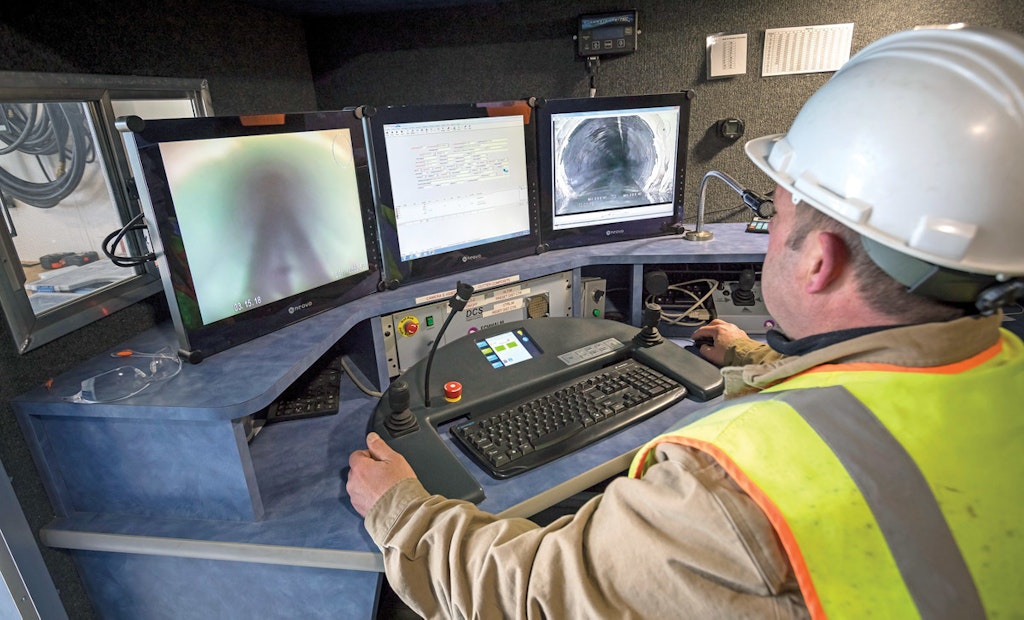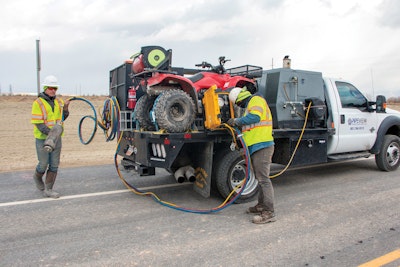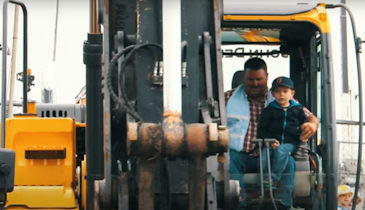
Patience and attention to detail are two skills that inspection technicians need. Many companies prefer to find people with the personality traits and soft skills they’re looking for and train them up, rather than finding experienced technicians who may not be the perfect fit for the company culture. (Photos courtesy of PipeView Services)
Interested in Inspection?
Get Inspection articles, news and videos right in your inbox! Sign up now.
Inspection + Get AlertsThe saying “Good help is hard to find” has never been more true. Nevertheless, companies that perform pipeline inspections such as Great Lakes TV Seal in Green Bay, Wisconsin, and PipeView Services based in Lehi, Utah, still need to find, train and retain the best inspection technicians.
Not many people know what pipeline inspection entails, let alone consider this job as a lifelong career. This is why Brett Healy, Great Lakes TV Seal’s co-owner and engineer, pulls out all the stops when looking for new help.
The right people
“We put advertisements online that get shown when people do job searches on sites like Indeed.com,” Healy says. “As well, there are a lot of high schools around here. They hold career fairs where we actually exhibit just like we would for an industrial seminar. I’m also active in the technical schools here in Wisconsin. I put our name out into programs they have that might be similar to what we do — utility programs, even welding programs — and I hire through there.”
Joseph Turley is owner and president of PipeView Services. He too does whatever he can to attract new help, and he doesn’t mind if potential applicants lack job experience. “We’ve always trained them ourselves, with very, very few exceptions,” Turley says.
“Ninety-nine percent of the time they’re not going to have experience,” Healy adds. “So I just expect that, for everybody that comes in here, I will be training them.”
The right traits
Not everyone who applies to be an inspection technician is suited to the task, but there are some specific traits to look for in candidates for the job.
“Being patient and detail-oriented is good, along with being organized, self-directed and a good communicator,” Turley says. “They also have to have maturity and the ability to accept responsibility in order to do this job successfully. In particular, good communication is essential when you’re a pipe inspector, because you’re constantly communicating with clients, the laborers that are working with you, and the general contractor that hired you. This is why it’s easier to find the right personality that’s untrained and train them to be a pipeline inspector, than to find a trained person with the wrong personality who doesn’t fit in your company.”
In addition to the skills listed above, Healy looks for applicants who are confident and mentally adept. “I try to test them during the interview on problem-solving,” he says. “Utmost and foremost, I want this person to be able to go out and make wise decisions on their pipeline inspections. Good communication skills tie into this: I want them to be able to communicate effectively with the customer. They can write out on paper if need be, but if they can’t communicate it in a fashion that somebody can understand it at the end result of the deliverable, it’s no good.”
Keeping up with the paperwork associated with pipeline inspections also matters. “During their training period, I’m watching their daily reports come in,” Healy says. “I’m watching how their timecards are filled out. And if I don’t see things that are indicative of a good pipeline inspector, then we just put it on hold.”
The right training
Both companies use on-the-job training to educate their inspection techs. Prospective candidates start out as general laborers assisting veteran technicians, working their way up the ladder over a year’s time (or longer, if needed) as they gain skills and experience.
“We only extend this training to new employees who are invested in staying with the company, rather than people only looking for a paycheck,” Turley says. “Over the year, our trainees learn all the ins-and-outs of the pipeline inspection process, from assembling the camera and placing it within the pipeline to assisting with all other elements of the job.”
“If somebody commits to being a pipeline inspector,” Healy says, “we’ll put them out with a crew with a mentor — another foreman — for about a year. If after six months I know that they’re stable and going to stick around, I will enroll them in NASSCO’s Pipeline Assessment Certification program.”
To help these students learn, Great Lakes TV Seal provides them with DVDs/jump drives loaded with videos shot inside pipelines. “We put them in a classroom with a computer, they play the video and they code what they’re seeing, starting with real easy PVC pipes,” Healy says. “I then review their work, make corrections if necessary, then move onto something more difficult.
“When they can correctly diagnose a pipeline that is truly old and full of ridiculous defects, then they go back out with their foreman and they switch roles. The foreman becomes the laborer and the new inspector starts running the truck. When the student pipeline inspector can do this with confidence, and I get that reported back to me by the original foreman, then we buy him a truck and out he goes.”
Keeping skilled pipeline inspectors is a smart move for companies, given the time and money required to train them, and the shortage of skilled replacements standing outside the front door waiting to take their place.
As in any other part of the job market, money talks. To keep their technicians, companies have to offer them competitive wages and benefits. Otherwise someone else eventually will.
“My philosophy is, if you take care of the employees, the employees will take care of the company,” Turley says. “This is why we offer competitive wages and benefits, based on a survey done each year by the Associated General Contractors of Utah, to which we belong. I get the results of that survey later on in the year, and it guides us on what we pay.”
“We do have good pay and benefits,” Healy says. “And we also have bonus programs where our guys get a percentage of the profits they make for us. It puts them in the business. We even fill in a job ledger for every job: The guys know all the credits and debits for every job they have done, including where the money went. I think that adds to the family feel of Great Lakes Seal TV for our people. They actually feel like they’re part of it.”
It’s also important to treat employees with respect and to create positive working environments free from harassment and emotional drama. But at the end of the day, choosing the right people to train as inspection technicians makes the most difference in retaining them, while also keeping customers happy. “If they like what they’re doing, even if it’s putting a camera through a sewer pipe, and they’re problem-solvers, then they tend to stick around,” Turley says.
Even in today’s tight labor market, it is possible to find, train and retain the right kind of people as inspection technicians. It just requires effort and attention to details by the companies who hire them.






